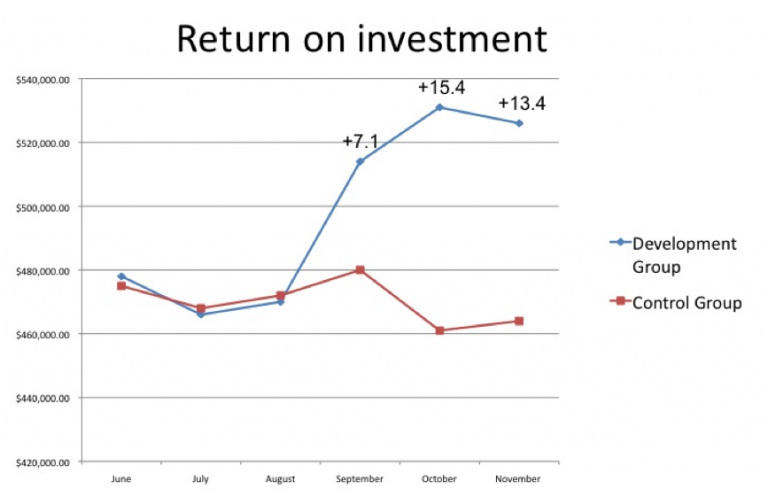Background
Sanofi-Aventis is the fourth largest pharmaceutical company worldwide with nearly 105,000 employees in over 110 countries.
Genos had previously conducted a research study with pharmaceutical sales representatives showing a direct relationship between sales reps emotional intelligence and their performance as measured in revenue generated. While convinced of the relationship, Sanofi-Aventis wanted to examine whether the emotional intelligence of sales representatives could be improved and whether such improvements would in fact result in increased sales revenue.
The Genos Solution
To factor out market influences and to allow for a more exact comparison, Genos asked Sanofi-Aventis to select a large group of representatives who were all similar in terms of tenure with the organisation and sales performance. Following this request Sanofi-Aventis selected 70 sales representatives for Genos to work with who were then randomly split into two groups: a Development Group who would participate in an emotional intelligence development program; and a Control Group, who would be assessed in terms of their emotional intelligence and sales performance only.
Genos designed an emotional intelligence development program for both the sales representatives and their sales managers. The program involved:
- A Time 1, 360-degree assessment of sales managers emotional intelligence and an assessment of their sales reps performance at the outset
- One full day and two half-day workshops on how to utilize emotional intelligence skills in sales
- Eight small group (n=5) coaching sessions for the sales managers
- Five emotional intelligence-mentoring sessions between sales managers and their reps. The purpose of these sessions was for managers to fine tune their sales representatives application of emotional intelligence on sales calls
- A Time 2, 360-degree assessment sales managers emotional intelligence and re-assessment of their sales reps performance
Results
On average, the emotional intelligence of the sales managers improved by 18 percent. As can be seen in the graph below this helped facilitate an average 13% improvement in the Development Group’s sales performance in comparison to the Control Group’s. There was a 7.1% improvement in the first month following the program, a 15.4% improvement the next month and 13.4% improvement the month after that (as measured by retail sales revenue by territory). The revenue of the Control Group stayed flat and in the same revenue band during this period.

The improvements in revenue generated by the Development Group returned approximately $6 for every $1 Sanofi-Aventis invested in the pilot program. This is one of the only studies of its type showing direct improvements on the bottom line as a result of improvements in emotional intelligence. This program won the 2006 Australian Institute of Learning and Development Achievement Award for an outstanding contribution to the practice of learning and development.
Participant Feedback
Feedback from the participants showed the program not only helped improve the sales performance of reps and their managers, it also helped them improve their relationships with each other. Employees had been navigating a difficult time within the business as bumps from the merger were ironed out and the two cultures integrated. As one participant put it:
I have seen improvements in behaviour that have increased the bottom line with sales reps. From a management perspective, increased skills that have lead to more buy-in, acceptance, spirit improved, and better communication.

